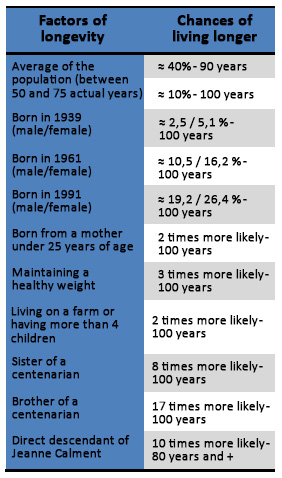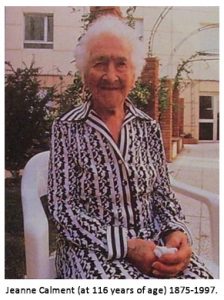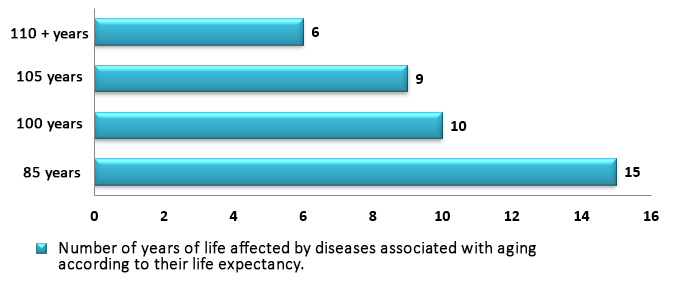In the year 2000, the world population of centenarians was estimated at 180,000. It should be 3.2 million by the year 2050. What are these people doing to live so long? Are they living healthy or are they simply living with illness longer? Is it through diet, genetics, physical activity?
 Moreover, what about the fact that families who live particularly longer also age better? Certain personality traits of these families have been identified as characteristics of centenarians.
Moreover, what about the fact that families who live particularly longer also age better? Certain personality traits of these families have been identified as characteristics of centenarians.
Understanding these multiple factors will allow us to establish their respective importance.
The likelihood of living until old age
Certain factors, shown in the attached table, probably underscore the importance of being active throughout our lives. It is obvious that a farmer’s level of physical activity is higher than average. What about parents in families with more than four children?
It is interesting to note that although life expectancy is increasing, many families are now having children at a later age (over 30) and this would reduce the chances of these children living to 100 years. From a biological point of view, several theories have been proposed to explain this phenomenon. It is also well known that women over the age of 35 are much more at risk of having difficult pregnancies and therefore have the right to more rigorous medical monitoring.
JEANNE CALMENT
This is the longest-lived person, whose date of birth can be established with certainty. She was born on February 21st in 1875 and lived 122 years and 164 days. Of course, this is a woman. Studies have shown that among super-centenarians living over 110 years, the ratio of men to women is 1:9. In addition, the longevity of children in a family is always better correlated with the age at death of the mother, rather than that of the father.
in 1875 and lived 122 years and 164 days. Of course, this is a woman. Studies have shown that among super-centenarians living over 110 years, the ratio of men to women is 1:9. In addition, the longevity of children in a family is always better correlated with the age at death of the mother, rather than that of the father.
Although it is clear that the descendants of centenarians have a much better chance of living 100 years and more, genetics would only explain 15 to 25% of the chances of longevity. The remaining 75 to 85% are said to be dependent on lifestyle habits, physical activity, body weight, diet, stress management, and emotional health in general.
Genetics to live over one hundred years
An important discovery has identified a genetic mutation that increases the life expectancy of nematodes (microscopic worms) by ten times. Thus, certain genes in the genetic makeup can have a very significant impact on life expectancy. However, in humans, the regulation of metabolic pathways often involves more receptors, genes and enzymes than in simpler organisms such as nematodes. The systems are said to be “redundant”. This allows finer control of biological processes.
This increase in complexity thereby reduces the importance of modifying a single gene in humans. The altered gene may have its effect canceled out by the presence of a different receptor or another predominantly active gene.
As mentioned previously, it is estimated that 15 to 25% of longevity is explained by genetics. This data comes from studies conducted on a large number of identical twins.
In the case of centenarians, the positive influence of genetics would be 33% in women and 48% in men. Therefore, genetics would be responsible for 25-30% of the lifespan of the majority of the population and 33-48% for centenarians.
This data should be taken with a grain of salt since it is extremely difficult to assess the impact of lifestyle habits with control groups (comparison controls). It’s hard to find people who have lived the same way, who do not have the same genetic background and whose life expectancy can be known.
The search for the genes of longevity
To better understand the importance of genetics on human longevity, a large number of studies had to be conducted. The majority of these studies focused on researching the reasons for this longevity in relation to family inheritance or lifestyle habits. Very few significant links were found to explain longevity and some of these genetic links were subsequently invalidated when compared with populations from other countries.
With the improvement of genetic sequencing techniques, it is now possible to study the influence of certain specific genes or even to sequence the entire genome of certain centenarians. Recently, two genomes of supercentenarians (people who lived for more than 114 years) were sequenced to study the presence or absence of certain genes.
In the year 2000, it was estimated that in the United States, there were nearly 33,000 centenarians, but only about one hundred super-centenarians over 110 years old.
Here are two simple hypotheses to explain the longevity of centenarians from a genetic point of view:
- the absence of a genetic content responsible for diseases (or which increases the risk of diseases),
- the presence of genetic content offering protection.
Since we know of a large number of genes responsible or involved in different diseases, it was relatively easy to verify their presence in centenarians.
Surprisingly, centenarians do not have fewer genes responsible or predisposed to diseases. Their long life would be possible due to a greater ability of maintenance and repair that would allow them to avoid these diseases by delaying/slowing down aging.
FOXO3 AND APOE
Only two genetic variants have clearly demonstrated an association with human longevity for different populations. This is the FOXO3 gene and the APOE variants (APOE2, 3 and 4). The impact of the FOXO3 gene would be consistent with the observation of greater resistance within centenarian populations, since this gene is heavily involved in maintenance and repair processes.
It is this gene that allows the hydra (a small aquatic organism) to maintain these viable stem cells forever, and thus allowing their constant regeneration.
An American study on the population of Japanese origin has shown a link between the size of individuals and their longevity. This link was correlated with the beneficial form of the FOXO3 gene discussed previously.
With regard to APOE, the implication is less obvious. Its genetic variants are implicated in cardiovascular and degenerative diseases. It is possible that its impact on human health is so significant that APOE4 (negative) could reduce the longevity of an individual who could have been 100 years old. It is also associated with a higher risk of Alzheimer’s disease.
OTHER GENES OF LONGEVITY
Although there are only two genetic variants very well supported by current studies, there are at least 8 genes strongly involved in human longevity studies: CETP, the IGF metabolic pathway, FOXO, ACE (related hypertension), SIRT1 (activated by resveratrol), Klotho, hTERT and APOE.
Some of these genes have shown a strong correlation with the longevity of centenarians for some studies and no correlation for other populations. For example, the angiotensin gene (ACE) linked to hypertension and cardiovascular disease has significantly increased life expectancy in some studies, without showing a significant impact for a population of Chinese centenarians. It is thus possible that certain positive factors for a given population do not represent a significant advantage for another population.
Research currently underway should tell us more about the link between these genes and human longevity. What is evident now is that the centenarians seem not to have fewer predispositions to disease, but greater resistance.
Postpone problems until tomorrow
One amazing facet of centenarians is their ability to ward off diseases associated with aging into the last period of their lives. One study assessed the proportion of life spent experiencing the harmful deleterious effects of diseases associated with aging.
It has been shown that for the average population, 17.9% of their life will be affected by diseases associated with aging. For a person living, for example, 85 years, this means that they will be affected by diseases associated with aging for 15 years: therefore, from the age of 70.
In addition, family members who live particularly long are affected much later by diseases associated with aging. They have a lower incidence of cancer, cardiovascular disease, diabetes, severe dementia, high blood pressure and osteoporosis. In members of these families, diseases associated with aging appear on average 10 years later than what is observed for the rest of the population.

In a future article, we’ll discuss the pleasing personality effect of centenarians and their culture.
References:
- Andersen, S.L., Sebastiani, P., Dworkis, D.A., Feldman, L., Perls, T.T. 2012. Health span approximates life span among many supercentenarians: compression of morbidity at the approximate limit of life span. J Gerontol A Biol Sci Med Sci. Apr;67(4):395-405.
- Brooks-Wilson, A.R. 2013. Genetics of healthy aging and longevity. Hum Genet. Dec;132(12):1323-38. Review.
- Dato, S., Crocco, P., D’Aquila, P., de Rango, F., Bellizzi, D., Rose, G., Passarino, G. 2013. Exploring the role of genetic variability and lifestyle in oxidative stress response for healthy aging and longevity. Int J Mol Sci. Aug 8;14(8):16443-72.
- Gavrilova, N.S., Gavrilov, L.A. 2010. Search for mechanisms of exceptional human longevity. Rejuvenation Res. Apr-Jun;13(2-3):262-4. Review.
- He, Q., Morris, B.J., Grove, J.S., Petrovitch, H., Ross, W., Masaki, K.H., Rodriguez, B., Chen, R., Donlon, T.A., Willcox, D.C., Willcox, B.J. 2014. Shorter men live longer: association of height with longevity and FOXO3 genotype in American men of Japanese ancestry. PLoS One. May 7;9(5):e94385.
- Kolovou, G.D., Kolovou, V., Mavrogeni, S. 2014. We are ageing. Biomed Res Int. 2014:808307.
- Nebel, A., Bosch, T.C. 2012. Evolution of human longevity: lessons from Hydra. Aging (Albany NY). Nov;4(11):730-1.
- Sebastiani, P., Bae, H., Sun, F.X., Andersen, S.L., Daw, E.W., Malovini, A., Kojima, T., Hirose, N., Schupf, N., Puca, A., Perls, T.T. 2013. Meta‐analysis of genetic variants associated with human exceptional longevity. Aging (Albany NY). 2013 Sep;5(9):653-61.
- Sebastiani, P., Perls, T.T. 2012. The genetics of extreme longevity: lessons from the new England centenarian study. Front Genet. Nov 30;3:277.
- Sebastiani, P., Sun, F.X., Andersen, S.L., Lee, J.H., Wojczynski, M.K., Sanders, J.L., Yashin, A., Newman, A.B., Perls, T.T. 2013. Families Enriched for Exceptional Longevity also have Increased Health-Span: Findings from the Long Life Family Study. Front Public Health. Sep 30;1:38.
- Tazearslan, C., Cho, M., Suh, Y. 2011. Discovery of functional gene variants associated with human longevity: opportunities and challenges. J Gerontol A Biol Sci Med Sci. 2012 Apr;67(4):376-83.
- Willcox DC, Willcox BJ, Hsueh WC, Suzuki M. 2006. Genetic determinants of exceptional human longevity: insights from the Okinawa Centenarian Study. Age (Dordr). Dec;28(4):313-32.





